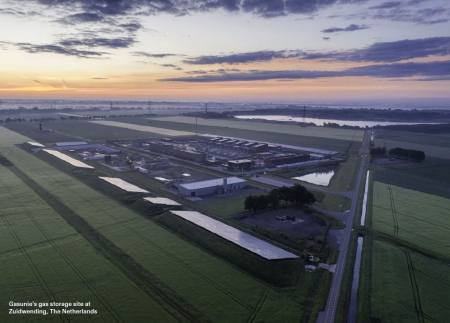Netherlands presents plans for hydrogen spot market [GasTransitions]
The goal of the plan, which was favourably received by the Dutch government, is to create a transparent spot market for hydrogen in the Netherlands, to which other European markets can later be connected.
The strategic goal behind the initiative is to ensure that the Netherlands becomes the major hydrogen hub in North West Europe, in the same way as it is currently the number one natural gas trading and transport hub.
The plan is based on a study commissioned by the Dutch Ministry of Economic Affairs and prepared by Bert den Ouden of Dutch consultancy Berenschot. Den Ouden is co-founder and former CEO of APX-Endex, the Amsterdam-based electricity and gas spot market, which was launched in 1999 and today is part of the EPEX spot and ICE-Endex market platforms. He was one of the architects of “electricity market coupling” – the creation of interconnected spot power markets – in Europe.
The envisioned hydrogen exchange will be based on physical trading which is to be made possible by the national “hydrogen backbone” that Gasunie has started building in the Netherlands. This hydrogen pipeline network, which should be ready in 2026, will connect the major sea ports (Amsterdam, Rotterdam, Groningen, North Sea Port/Zeeland) and the five major industrial clusters in the Netherlands.
In his report, Den Ouden acknowledges that it will take a number of years before enough renewable hydrogen is produced to make a spot market possible. Nevertheless, he recommends that steps are taken now to make hydrogen pricing more transparent and help stimulate the emerging hydrogen market. He proposes four intermediate projects that could serve as stepping stones to a full-fledged national spot market:
- Start with a single point of trade, e.g. in the port of Rotterdam, if there is enough liquidity available.
- Start trading in “Guarantees of Origin” or green hydrogen certificates.
- Set up a “hydrogen price index” on the basis of a “pricing panel” in which major market parties are represented, the same way this was done in the oil industry in the past.
- Set up a market for hydrogen blending obligations.
According to Den Ouden, the Netherlands is in a “unique position” to become the hydrogen hub for North West Europe: it has large offshore wind resources in the North Sea, a large gas pipeline network and major ports serving in particular the German market. “Germany is key for us,” a spokesperson of the Port of Rotterdam said. “We want to be able in the future to supply German industry with the green raw materials it is asking for.”
|
Gasunie to build underground hydrogen storage facility In addition to preparing a hydrogen exchange, Gasunie has made a decision to build an underground hydrogen storage facility next to its existing gas storage caverns at Zuidwending in the province of Groningen in the Netherlands. Gasunie operates six gas caverns in the area, but there is room for four more, a company representative said at a recent webinar. Zuidwending is also the location of HyStock, a 1 MW electrolyser taken into operation last year. Gasunie has started on the construction of a national “hydrogen backbone” in the Netherlands – a network of hydrogen pipelines that will connect the five major industrial clusters in the country. For this purpose the company will mostly use existing gas pipelines which have become (or are becoming) superfluous as gas production from the giant Groningen field is being shut down. The hydrogen cavern is planned to be ready in 2026 or 2027, six months after the first part of the hydrogen backbone will become operational. It will be filled up to a third or half with cushion gas. Between 2024 and 2030 Gasunie will be completing the backbone with additional connections that are needed at certain points. The capacity of the network will be between 10 and 15 GW. The pressure in the system will initially be 10-30 bar, which will then be expanded to 30-50 bar, with local deviations possible. How pure the hydrogen in the system will be is not clear yet. Total costs of both projects are estimated at €1.5 to €2 billion. Gasunie is counting on government support in the short term, but assumes that market parties will be paying the costs in the longer term. It has asked Dutch industries for expressions of interest. The company will also be offering companies that cannot physically connect to the network the possibility to use hydrogen “virtually”, by means of hydrogen certificates, the same way this is done with renewable energy certificates. |




